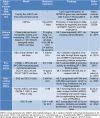Potential of melatonin to reverse epigenetic aberrations in oral cancer: new findings
- PMID: 38234969
- PMCID: PMC10792176
- DOI: 10.17179/excli2023-6624
Potential of melatonin to reverse epigenetic aberrations in oral cancer: new findings
Abstract
It is now an accepted principle that epigenetic alterations cause cellular dyshomeostasis and functional changes, both of which are essential for the initiation and completion of the tumor cycle. Oral carcinogenesis is no exception in this regard, as most of the tumors in the different subsites of the oral cavity arise from the cross-reaction between (epi)genetic inheritance and the huge challenge of environmental stressors. Currently, the biochemical machinery is put at the service of the tumor program, halting the cell cycle, triggering uncontrolled proliferation, driving angiogenesis and resistance to apoptosis, until the archetypes of the tumor phenotype are reached. Melatonin has the ability to dynamically affect the epigenetic code. It has become accepted that melatonin can reverse (epi)genetic aberrations present in oral and other cancers, suggesting the possibility of enhancing the oncostatic capacity of standard multimodal treatments by incorporating this indolamine as an adjuvant. First steps in this direction confirm the potential of melatonin as a countermeasure to mitigate the detrimental side effects of conventional first-line radiochemotherapy. This single effect could produce synergies of extraordinary clinical importance, allowing doses to be increased and treatments not to be interrupted, ultimately improving patients' quality of life and prognosis. Motivated by the urgency of improving the medical management of oral cancer, many authors advocate moving from in vitro and preclinical research, where the bulk of melatonin cancer research is concentrated, to systematic randomized clinical trials on large cohorts. Recognizing the challenge to improve the clinical management of cancer, our motivation is to encourage comprehensive and robust research to reveal the clinical potential of melatonin in oral cancer control. To improve the outcome and quality of life of patients with oral cancer, here we provide the latest evidence of the oncolytic activity that melatonin can achieve by manipulating epigenetic patterns in oronasopharyngeal tissue.
Keywords: adjuvant therapy; epigenetic; gene expression; melatonin; microRNAs; oral cancer.
Copyright © 2023 Gil-Martín et al.
Conflict of interest statement
The authors declare that they have no conflict of interest.
Figures


Similar articles
-
Potential of Melatonin as Adjuvant Therapy of Oral Cancer in the Era of Epigenomics.Cancers (Basel). 2019 Nov 2;11(11):1712. doi: 10.3390/cancers11111712. Cancers (Basel). 2019. PMID: 31684096 Free PMC article. Review.
-
Effect of melatonin supplementation in combination with neoadjuvant chemotherapy to miR-210 and CD44 expression and clinical response improvement in locally advanced oral squamous cell carcinoma: a randomized controlled trial.J Egypt Natl Canc Inst. 2020 Feb 28;32(1):12. doi: 10.1186/s43046-020-0021-0. J Egypt Natl Canc Inst. 2020. PMID: 32372215 Clinical Trial.
-
Dietary glycation compounds - implications for human health.Crit Rev Toxicol. 2024 Sep;54(8):485-617. doi: 10.1080/10408444.2024.2362985. Epub 2024 Aug 16. Crit Rev Toxicol. 2024. PMID: 39150724
-
Role and Therapeutic Potential of Melatonin in Various Type of Cancers.Onco Targets Ther. 2021 Mar 18;14:2019-2052. doi: 10.2147/OTT.S298512. eCollection 2021. Onco Targets Ther. 2021. PMID: 33776451 Free PMC article. Review.
-
Melatonin and Its Role in the Epithelial-to-Mesenchymal Transition (EMT) in Cancer.Cancers (Basel). 2024 Feb 27;16(5):956. doi: 10.3390/cancers16050956. Cancers (Basel). 2024. PMID: 38473317 Free PMC article. Review.
References
-
- Abdel-Rahman Mohamed A, Khater SI, Metwally MMM, Bin Emran T, Nassan MA, Abd El-Emam MM, et al. TGF-beta1, NAG-1, and antioxidant enzymes expression alterations in Cisplatin-induced nephrotoxicity in a rat model: Comparative modulating role of melatonin, vit. e and ozone. Gene. 2022;820:146293. doi: 10.1016/j.gene.2022.146293. doi: 10.1016/j.gene.2022.146293. Available from: - DOI - DOI - PubMed
-
- Aghiorghiesei O, Zanoaga O, Nutu A, Braicu C, Campian RS, Lucaciu O, et al. The world of oral cancer and its risk factors viewed from the aspect of microRNA expression patterns. Genes (Basel) 2022;13(4):594. doi: 10.3390/genes13040594. doi: 10.3390/genes13040594. Available from: - DOI - DOI - PMC - PubMed
-
- Al Rawi N, Elmabrouk N, Abu Kou R, Mkadmi S, Rizvi Z, Hamdoon Z. The role of differentially expressed salivary microRNA in oral squamous cell carcinoma. A systematic review. Arch Oral Biol. 2021;125:105108. doi: 10.1016/j.archoralbio.2021.105108. doi: 10.1016/j.archoralbio.2021.105108. Available from: - DOI - DOI - PubMed
Publication types
LinkOut - more resources
Full Text Sources
